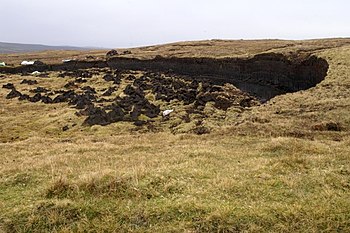 |
| Blanket Bog - Wikipedia |
It takes one thousand years to grow just a one meter depth of bog. The peat itself consists of 95% water, the remainder made up of rotted vegetation, pollen, dust and the like. In Ireland, it has traditionally been cut and dried and burned in the fireplace as turf.
 |
| Ireland Peat Cutting - Public Domain Images |
Our Irish ancestors depended on this fuel to survive.
The Tithe Applotment records of Listowel Parish in County Kerry show that 113 acres of Thomas English's 235 acre holding were bog. Interestingly this is not recorded in Griffith's although other holdings in the area did say they included bog land.
 |
| Carrownaclea - Islandeady Field Book - 1841 |
The 1841 Carrownaclea (Mayo) Field Book shows bog lands. Carrownaclea is interesting in that in both the Tithe Applotments and Griffith's Valuations the entire townland is linked together, no one appears to have a specific piece of land, yet in the field book it is divided into 8 holdings. Perhaps the residents (including the Geraghtys) were all laborers in the employ of Capt. Wyndham who owned the land in fee.
 |
| Derrycoosh - Islandeady Field Book 1841 |
Like Carrownaclea, Griffith's Valuations for Derrycoosh (Mayo) does not give the acreage of holdings, however combining it with the 1841 Field book, we find the following description for the land held by Patrick Walsh (son of John).
In Roscommon, the Delmore's lived in town and would most likely have bought their turf as needed. Martin Somer's held 15 acres in Scregg. About 1/2 was considered arable the other half did not appear to be bog but rather too gravelly with shallow topsoil. Other areas of the townland did include some bog.
This is just a sample of what the land of our ancestors was like. If they did not have bog land in their possession, they might have been allowed a share from other land of the landlord, they might have traded other commodities for turf, they might have bought turf when they had money, and worst case, they might have gone without heat and the ability to cook in hard times.
- Peatlands - Notice Nature
- The Rattlin' Bog - The Irish Rovers
No comments:
Post a Comment